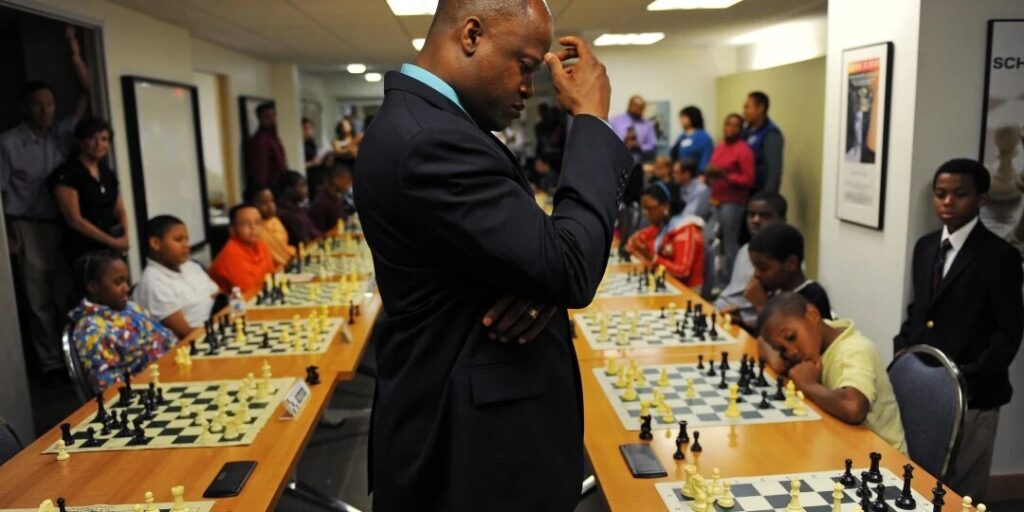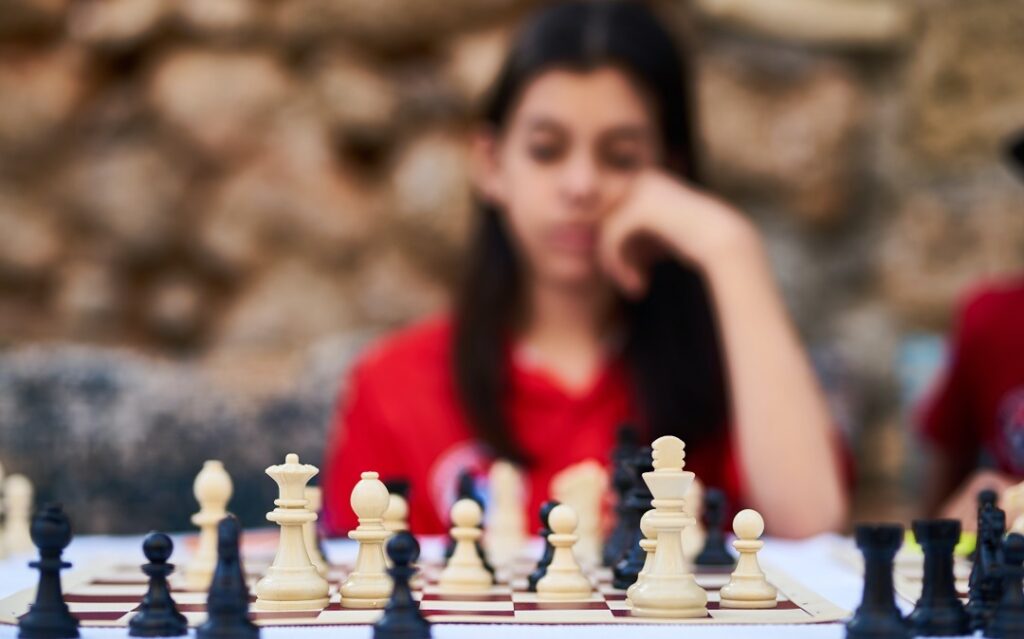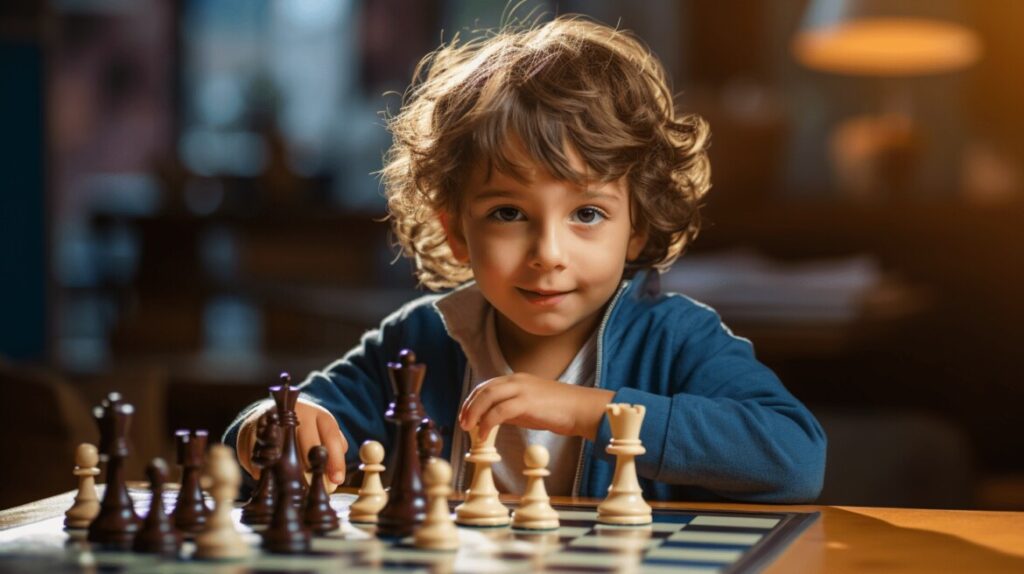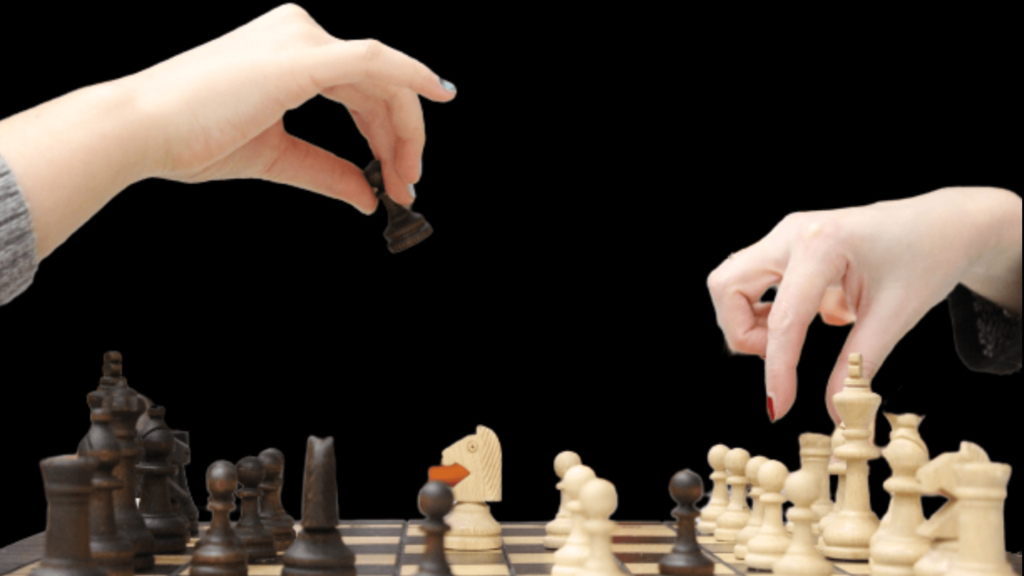Chess is often seen as a game for intellectuals, but it’s much more than that. It’s a brain-training tool that sharpens the mind and helps develop key problem-solving skills. When we think of ways to improve mental capacity or enhance cognitive abilities, chess may not be the first thing that comes to mind for most people, but its power to transform the way we think is undeniable.
How Chess Engages the Brain
When you sit down to play chess, you’re instantly faced with a problem: How do you outsmart your opponent?
The goal is to checkmate the other player, but getting there requires thinking several moves ahead, anticipating your opponent’s responses, and adapting to new challenges as they arise. In other words, chess forces you to think critically and strategically right from the start.
At its core, chess is a game of problem-solving. Each move presents a new puzzle. This constant mental engagement pushes players to improve their thinking and reasoning skills.
The more a person plays, the sharper their brain becomes in handling complex situations.
Activating Both Sides of the Brain
One of the unique aspects of chess is how it engages both sides of the brain. The left hemisphere, which is responsible for logical thinking and analysis, gets plenty of exercise during chess as players calculate moves, think through consequences, and strategize.
At the same time, the right hemisphere, which handles creativity, is engaged as players look for unexpected, imaginative moves or spot patterns.
This dual engagement is rare in many activities, but chess requires it constantly. Players must balance logical reasoning with creative problem-solving, making it one of the best brain workouts available.
Thinking Ahead and Anticipating Problems
A key element of chess is learning to think ahead. Successful players don’t just react to their opponent’s last move; they anticipate what’s coming next.
This requires a deep understanding of cause and effect. Every move has consequences, and players must constantly evaluate how their current decisions will shape the game in the future.
This type of forward-thinking is a crucial problem-solving skill. In life, problems are often multi-layered and require several steps to solve.
Chess teaches players to think not just about the immediate issue, but about the long-term impact of their decisions.
Developing Patience and Strategic Thinking
One of the most valuable lessons chess teaches is patience. Unlike many games where speed and quick reactions are key, chess is all about thinking carefully and waiting for the right moment to make a move.
Rushing through the game or acting impulsively usually leads to mistakes. Instead, players must learn to wait, analyze the board, and act strategically.
This lesson carries over into life. Problem-solving in the real world often requires the same careful consideration and planning.
Whether it’s working through a challenging homework problem, managing a tricky situation with friends, or figuring out how to approach a big project, chess shows kids (and adults) that thoughtful, strategic action is often better than a quick, rushed decision.
Breaking Problems Into Steps
In chess players are often confronted with complex positions that seem difficult to navigate. However, skilled players learn to break these situations down into smaller, more manageable parts.
They identify key threats or opportunities, deal with them one by one, and gradually move toward their overall goal.
This method of breaking a big problem into smaller, solvable steps is a key skill in problem-solving.
Children who play chess learn to take a step-by-step approach to challenges, making even the most complicated tasks feel manageable. Whether in math, science, or even life’s bigger problems, this ability to break things down into smaller tasks is invaluable.
Learning From Mistakes
In chess, mistakes are unavoidable. Even the best players make wrong moves. What separates a good chess player from a great one is their ability to learn from these mistakes.
After a game, it’s common for players to go back through their moves, figure out what went wrong, and think about how they can improve.
This reflective process is critical to developing problem-solving skills. Children who play chess learn that mistakes are part of the process, not something to be feared.
They begin to see errors as opportunities for growth, not reasons to give up. This mindset helps them become more resilient and adaptable, both on the chessboard and in everyday situations.
Enhancing Logical Thinking
Chess is, at its core, a game of logic. Every move has a reason behind it, and each decision must be justified by solid reasoning.
Players are constantly asking themselves questions like: “If I move this piece, what will my opponent do?” or “How does this move improve my position?” By consistently thinking through these logical questions, players develop sharper reasoning abilities.
In real life, this logical thinking helps in a wide variety of situations. Whether solving a math problem, figuring out how to organize a project, or making a difficult decision, chess trains players to approach problems logically and methodically.
The ability to think through each step, consider possible outcomes, and make informed decisions is crucial for problem-solving in any area of life.
Building Focus and Concentration
Chess requires deep concentration. During a game, players must focus on the position of each piece, think about their next move, and anticipate their opponent’s strategy.
Losing focus for even a moment can lead to costly mistakes. This level of mental discipline helps sharpen focus and improves attention span.
In today’s fast-paced world filled with distractions, the ability to concentrate on a single task is a powerful skill. Chess teaches players to block out distractions and keep their mind fully engaged in the game.
Over time, children who play chess develop better focus, which helps them in school, sports, and other areas of life. This skill is especially useful when they need to complete homework or projects that require sustained mental effort.
Strengthening Memory and Pattern Recognition
Another significant benefit of playing chess is the way it strengthens memory. As players get better, they begin to recognize patterns and remember past games, strategies, and tactics.
This pattern recognition is essential in chess, as many positions on the board follow common themes, and players need to recall how similar situations played out before.
This ability to recognize and remember patterns helps in many areas of life. In school, for example, students may notice patterns in math problems or language structures, making it easier to solve them.
In science, recognizing patterns is key to understanding concepts like formulas, ecosystems, or chemical reactions. Chess helps train the brain to recognize and recall information more effectively, which boosts academic performance and problem-solving abilities.
Handling Pressure and Making Decisions Under Stress
In chess, especially during timed games or tournaments, players must make decisions under pressure. They don’t always have the luxury of spending minutes or hours thinking about each move.
Sometimes, they must make quick decisions while under stress, knowing that one wrong move can shift the entire game.
This pressure to make decisions quickly while staying calm is a vital life skill. In real-world situations, whether it’s taking a timed test, dealing with a difficult situation, or making an important decision, staying calm under pressure is key.
Chess teaches players to keep their emotions in check, think clearly under stress, and trust their decision-making process.
Encouraging Creative Problem-Solving
While chess is based on logic, it’s also a game that requires creativity. There’s no single “correct” way to win a chess game.
Players often have to come up with creative solutions to escape difficult positions or surprise their opponent with an unexpected move. Chess encourages players to think outside the box, trying unconventional ideas when standard strategies don’t work.
This kind of creative problem-solving is incredibly valuable in everyday life. Whether kids are facing a tough homework assignment, coming up with a new idea for a project, or navigating a personal challenge, the ability to think creatively helps them find solutions others might not see.
Chess shows that sometimes, the best way to solve a problem isn’t the most obvious one.
Fostering Patience and Delayed Gratification

Chess teaches an important lesson in delayed gratification. Players can’t expect to win immediately after their first few moves.
Success in chess often comes after careful planning and waiting for the right moment to strike. Sometimes, a player must patiently build up their position, sacrificing pieces or waiting several turns to execute a successful strategy.
This lesson applies directly to life. Whether it’s studying for a test, working on a long-term project, or improving a personal skill, results don’t come right away.
Chess teaches children to value the process of working toward their goals, knowing that patience and persistence pay off in the end.
Encouraging Independence and Self-Reliance
One of the powerful aspects of chess is that it’s an individual game. When a child is playing, they are fully responsible for their moves.
There is no team to lean on, no one to blame if things go wrong, and no one to make decisions for them. This helps kids develop independence. They learn that their choices, good or bad, have consequences, and they must own the outcomes.
This sense of accountability helps children develop self-reliance. They become more confident in their own ability to solve problems, knowing they can make decisions and handle the results on their own.
Whether they are faced with a personal challenge, schoolwork, or life decisions, children who play chess are more likely to take responsibility for their actions and trust in their ability to navigate obstacles.
Building Emotional Resilience
In chess, not every game will go your way. Losing is a natural part of the game, and it happens to even the most skilled players. Kids who play chess learn how to deal with disappointment, frustration, and defeat.
Rather than seeing a loss as a failure, they come to see it as an opportunity to learn. They can review the game, identify where they went wrong, and use that knowledge to improve in future games.
This emotional resilience is incredibly valuable in life. Children learn that setbacks and failures are part of any journey and should be embraced as learning experiences.
Whether it’s getting a bad grade on a test or dealing with a difficult situation, kids who play chess are better equipped to handle adversity with a positive mindset and a focus on improvement.
Teaching the Value of Reflection
One of the most beneficial aspects of chess is the practice of reflecting on past games. After a game, it’s common for players to review their moves, analyzing what went well and what could have been done differently.
This reflection allows players to see patterns in their decision-making, recognize their strengths and weaknesses, and adjust their strategies accordingly.
In life, this habit of reflection can be incredibly useful. Whether it’s reviewing a day at school, a project at work, or a personal decision, taking the time to think back on what happened and learn from it helps kids (and adults) continuously improve.
Chess helps instill the habit of thoughtful reflection, making it easier for children to grow and develop in all areas of life.
Strengthening Decision-Making Skills

In chess, every move is a decision that has consequences. Players constantly weigh their options, evaluate the risks, and consider the benefits of each choice.
Should they attack now or defend? Should they sacrifice a piece to gain an advantage later? These decisions must be made with careful thought, and each one can change the course of the game.
This constant decision-making practice strengthens a child’s ability to make smart, informed choices. Chess trains kids to think through their options, consider possible outcomes, and make a decision based on logic rather than impulse.
This process helps them become more confident in their ability to make decisions in life, whether it’s deciding how to approach a school project, handle a friendship issue, or manage their time wisely.
Improving Spatial Awareness
Chess helps develop spatial awareness, which is the ability to understand and mentally visualize the positions of objects in space.
During a game, players must visualize how their pieces will move, how their opponent’s pieces might respond, and how different positions on the board interact with each other.
This skill is crucial in many areas of life. Spatial awareness is particularly useful in fields like math, engineering, architecture, and even sports. Kids who play chess often find it easier to grasp concepts that involve spatial relationships, such as geometry or physics.
Whether it’s packing a bag efficiently, navigating through a busy room, or understanding maps, spatial awareness is a practical skill that chess naturally develops.
Enhancing Planning and Organizational Skills
Chess teaches children to plan ahead. A successful game requires not only responding to the immediate position on the board but also anticipating several moves into the future.
Players must think through their long-term strategy, organize their pieces in a way that supports their overall plan, and execute that plan step by step.
This practice translates directly into real-life planning and organization. Whether it’s managing time, organizing a school project, or setting personal goals, kids learn to approach tasks with a clear plan in mind.
Chess helps them understand the importance of preparation, staying organized, and following through on their plans, leading to more efficient and successful outcomes in both school and personal life.
Nurturing a Growth Mindset
A critical lesson chess teaches is that improvement comes from effort and learning from mistakes. No one becomes a chess master overnight.
Even the best players started out making errors, losing games, and feeling frustrated. But with time, practice, and a willingness to learn, they improve.
This idea of continual improvement fosters a “growth mindset”—the belief that intelligence and abilities can be developed through dedication and effort.
Kids who play chess come to understand that success isn’t about being born smart or talented. It’s about learning, practicing, and getting better over time. This mindset helps them approach challenges in life with a positive attitude, knowing that they can improve and succeed with persistence and hard work.
Promoting Emotional Intelligence
Chess isn’t just about mental skills; it also helps develop emotional intelligence.
During a game, players experience a wide range of emotions—excitement, frustration, tension, or even disappointment after a loss. Learning to manage these emotions and stay calm under pressure is a critical part of becoming a successful chess player.
This emotional control is an important life skill. Chess teaches children to remain composed and think clearly, even when they are feeling stressed or upset.
By learning to keep their emotions in check, they become better at handling challenges in school, relationships, and personal situations without letting their feelings take over. Over time, this emotional resilience makes them more confident and capable problem-solvers.
Teaching Fair Play and Respect
Chess is a game built on respect. Regardless of the outcome, players are taught to shake hands and acknowledge their opponent’s effort.
Whether they win or lose, children learn the importance of fair play and good sportsmanship. Chess encourages players to respect the game, their opponent, and themselves.

This sense of respect is essential in life. Children who play chess carry these lessons into their everyday interactions, learning to treat others with kindness and dignity.
They also learn that losing isn’t something to be ashamed of but a natural part of growth and improvement. This healthy attitude toward competition helps them handle success and failure with maturity and grace.
Developing Social Skills Through Chess
Though chess is often seen as a solitary game, it can be a highly social activity. Whether playing face-to-face or online, kids engage with other players, learn from them, and share experiences.
Playing in chess clubs or tournaments also gives children the chance to meet others with similar interests, building friendships and a sense of community.
This social aspect of chess helps children develop interpersonal skills. They learn how to communicate, handle competition, and even collaborate in team chess events.
These social interactions help them build stronger relationships and improve their ability to work with others, both in school and in life.
Building Grit and Perseverance
Chess teaches grit—the ability to persevere through tough situations without giving up. Some games can last for hours, and winning often requires sustained mental effort.
Players must keep going, even when the game feels difficult or when they’re behind in material.
This persistence pays off, both in chess and in life.
Children who play chess learn to keep pushing forward, even when things get tough. They realize that every game offers a chance to come back, and this mentality helps them develop a strong sense of perseverance. This trait is invaluable as they face obstacles in their academic, personal, and future professional lives.
Encouraging Lifelong Learning
One of the beautiful things about chess is that no one ever truly masters it completely. Even the best players in the world are constantly learning new strategies, studying games, and improving their skills.
This culture of continuous learning encourages kids to adopt a lifelong approach to learning and personal growth.
In life, having a mindset of constant improvement is essential. Children who play chess understand that learning doesn’t stop after a game or a lesson.
They apply this curiosity and drive to other areas of their lives, embracing new challenges, exploring new subjects, and constantly seeking to improve.
Enhancing Cognitive Flexibility

Chess teaches players to think on their feet. Even the best-laid plans can be disrupted by an unexpected move from an opponent.
This forces players to quickly adapt their strategy, rethink their approach, and find a new path to success. In chess, as in life, flexibility is crucial.
Cognitive flexibility, or the ability to switch between different thoughts and adapt to new information, is essential for effective problem-solving.
Children who play chess regularly develop this skill, learning how to adjust their thinking when faced with new challenges. This mental agility helps them handle unexpected changes in school, social situations, or later in the workplace, ensuring they can adapt and thrive under pressure.
Improving Academic Performance
Research has shown that playing chess can have a positive impact on academic performance. The cognitive skills developed through chess—such as critical thinking, concentration, and logical reasoning—transfer to the classroom.
Chess players often show improvement in subjects like math, science, and reading because the game enhances their ability to think analytically and solve complex problems.
Additionally, the discipline and focus required in chess games help kids stay organized and attentive during lessons, enabling them to grasp difficult concepts more easily.
Whether it’s understanding mathematical equations or analyzing a piece of literature, the mental training from chess makes academic tasks less daunting.
Boosting Confidence and Self-Esteem
Chess can be a significant confidence booster. As children improve their game and start seeing the results of their hard work, they gain a sense of achievement.
Winning a game after a well-executed strategy or simply improving over time builds self-esteem and shows children that their efforts lead to real progress.
This newfound confidence extends beyond chess. Children begin to believe in their abilities to solve problems, tackle challenges, and succeed in other areas of life.
Whether it’s standing up to give a presentation, joining a new club, or handling personal difficulties, chess gives them the self-assurance they need to approach situations with a positive and capable mindset.
Promoting Goal Setting and Achievement
In chess, players don’t just focus on the next move; they have a larger goal in mind—checkmating their opponent. Reaching this goal requires setting smaller, intermediate objectives along the way, such as controlling the center of the board, developing pieces, or weakening the opponent’s defense.
This process of setting and achieving goals in chess teaches children the importance of working toward larger objectives in a structured way.
Whether it’s a long-term academic project or personal goals like improving fitness or learning a new skill, chess shows them how to break down big goals into smaller, manageable tasks that lead to success over time.
Expanding Cultural and Global Awareness
Chess is a universal game played by people of all ages, cultures, and backgrounds around the world. By learning and playing chess, children are exposed to a global community, either through local chess clubs, online platforms, or international tournaments.
They meet people from different cultures and backgrounds, helping them develop a more global perspective.
This exposure to different players from around the world fosters open-mindedness and an appreciation for diversity.
Chess becomes a bridge that connects children to a wider world, teaching them that despite differences, people can come together to enjoy a shared passion for the game. This sense of global connection is a valuable lesson for kids growing up in an increasingly interconnected world.
Creating Opportunities for Lifelong Friendships
While chess is often seen as an individual game, it creates a community of players who share a common interest. Whether it’s through casual games with friends, online matches, or participation in chess clubs and tournaments, chess provides children with opportunities to form lasting friendships.
These social bonds, created over the chessboard, are built on mutual respect, competition, and shared learning experiences.
Kids develop strong relationships with others who share their passion for the game, and these friendships can extend beyond the chess club, providing them with a support network that enhances their social and emotional well-being.
Chess as a Tool for Lifelong Learning
Chess is not just a game; it’s a lifelong learning journey. The mental skills developed through chess, such as strategic thinking, problem-solving, and adaptability, stay with players throughout their lives.
Whether you’re a beginner or a seasoned player, chess constantly offers new challenges that push the mind to grow and improve.
Building Character Through Chess
Beyond mental skills, chess builds character. It teaches patience, resilience, and the importance of hard work.
Players learn to respect their opponents, handle setbacks gracefully, and approach challenges with a positive attitude. These qualities make chess an excellent tool for developing strong character in children and adults alike.

A Simple Game With Complex Benefits
Though chess seems simple with its 64 squares and 32 pieces, the benefits it provides are profound. From enhancing cognitive abilities to improving emotional control, the game delivers complex rewards.
The beauty of chess lies in its balance between simplicity and depth, offering something valuable for players of all skill levels.
An Engaging Way to Strengthen Focus
In an era of constant distractions, chess helps develop the ability to focus deeply. It requires full attention to detail and concentration on the task at hand.
This focus helps children in academic settings and adults in their careers, making chess a unique brain-training tool that strengthens attention and sharpens the mind.
Preparing Kids for Future Challenges
Chess teaches skills that children will use throughout their lives.
Whether it’s handling stress, planning ahead, or staying calm under pressure, the lessons learned from chess prepare kids to face the challenges of the future. It builds a strong foundation for success, no matter where their path leads.
Wrapping it up.
Chess is much more than a game—it’s a powerful tool for developing superior problem-solving skills. It strengthens critical thinking, sharpens focus, builds resilience, and enhances decision-making, all while promoting patience and creativity.
The lessons learned through chess extend far beyond the board, helping children and adults alike tackle real-life challenges with confidence and strategy. Whether you’re looking to improve your cognitive abilities or simply enjoy a game that fosters personal growth, chess is a timeless way to train the brain for success.
If you’re ready to unlock the full potential of chess for yourself or your child, visit Global School of Chess to get started on this incredible journey!
READ NEXT:

